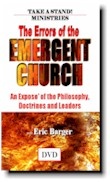What is a Cult?
 Tuesday, November 8, 2011 |
Tuesday, November 8, 2011 |  Post a Comment
Post a Comment What is a Cult?
Often, you hear Evangelical Christians refer to certain groups (such as Mormonism) as "cults". What does that mean? Are they using the term correctly?
It is always valuable to define the terms we use. The word cult means nothing unless it means something. Therefore, in an attempt to clarify rather than cloud the issue, I will try to define the term.
First, we should understand there are two common uses for the word "cult;" a sociological one and a theological one. The word, when used by sociologists, in the newspapers, and by the public in general, normally denotes a group which is led a charismatic leader who holds the membership of the group captive through coercion and manipulation. From this viewpoint, we recall men like the late Jim Jones, who led 900 of his followers to suicidal deaths in Guyana. Or, we think of the late Marshall Applewhite who also led his disciples to suicide in attempt to connect up with a space craft following in the wake of the comet Hale-Bopp.
However, this sociological definition is normally not the definition Evangelical Christians are thinking of when they use the word cult They are thinking of a somewhat different concept. The theological definition of the word used by Evangelicals stems from use of a word in the new Testament that is closely related to our word "sect." In Greek that word and its definition looks like this:
139 hairesis {hah'-ee-res-is}
from 138; TDNT - 1:180,27; n f
AV - sect 5, heresy 4; 9
1) act of taking, capture: e.g. storming a city
2) choosing, choice
3) that which is chosen
4) a body of men following their own tenets (sect or party)
4a) of the Sadducees
4b) of the Pharisees
4c) of the Christians
5) dissensions arising from diversity of opinions and aims
As you can see, this word is also the root for our word "heresy." Again, in Christian circles, the word heresy is used to describe beliefs which are different from what Christianity has described as "orthodox". And orthodox literal means "correct worship" or "correct doctrine." In other words heresy describes beliefs which are considered to be wrong.
We live in an age when it is nearly always unacceptable to tell people they are wrong about anything. But if a religious system is to exist at all it has to present a system of beliefs which it declares are "right beliefs." Obviously beliefs in contradiction to these "right beliefs" are, by definition, "wrong beliefs."
Normally the word "cult" identifies a subgroup of a larger group. A group which has split off from the older groups, or is in the process of splitting off. However, sometimes the word is used with nearly no negative meaning. When, for example, Catholics speak of the Cult of Mary, they often are not implying anything negative. They are identifying a specific group within the Catholic Church.
In the Bible, when Paul referred to "The cult of the Pharisees," he was not being negative. Paul, of course, disagreed with the Pharisees (often in the strongest of terms), but he was not resorting the name calling. For Paul, the word meant something like "The party of the Pharisees."
Throughout the history of Christianity subgroups have departed from mainstream or orthodox theology to become "heterodox" or "heretical." These are groups which often continue to claim to be essentially Christian, but which were regarded by the mainstream Christian churches as having "departed the faith."
This is the viewpoint orthodox Christians have of groups like Mormonism and the Jehovah's Witnesses. It is not that they are considered evil people; they are considered to be in serious theological error.
The use of the word "cult" should not be abandoned because some people use it in a significantly different way. Of course we should always be careful with the way we use words. And if we feel that people are misunderstanding our use of certain words, we should take the time to explain ourselves.
 Mark Wells in
Mark Wells in  The Cults
The Cults 









Reader Comments